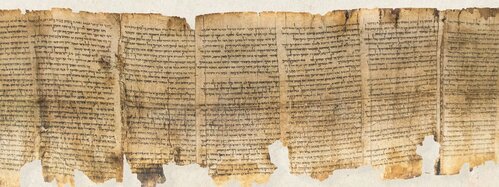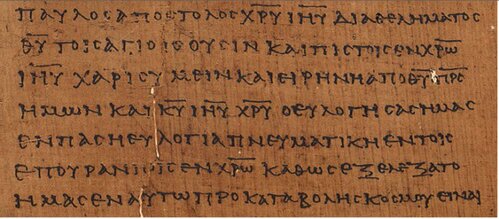The Bible contains 66 books and has two main sections:
1) The Hebrew Bible (often called the Old Testament) tells the story of God's work in and through the Hebrew people.
2) The Christian Bible (often called the New Testament) tells the story of Jesus Christ and the church formed after his resurrection.
1) The Hebrew Bible (often called the Old Testament) tells the story of God's work in and through the Hebrew people.
2) The Christian Bible (often called the New Testament) tells the story of Jesus Christ and the church formed after his resurrection.
The Hebrew Bible (Old Testament)
The Hebrew Bible was written over a long period, including segments from as old as the time of Moses (around 1300 BC). The earliest sections were likely handed down via oral tradition, with increasing amounts being written down over time. All parts of the Hebrew Bible were in written form by the time of the Babylonian exile. (Around 597 BC)
Christians regard the Hebrew Bible as inspired and authoritative writings that help us to know and understand God because Jesus, our Savior and Leader, clearly did. Jesus quoted from at least 24 books in the Hebrew Bible and viewed the Hebrew Bible as inspired and authoritative. See Matthew 22:29 as an example. All the Apostles and other leaders in the early church likewise regarded the Hebrew Bible as inspired and authoritative. See 2 Timothy 3:16–17, 2 Peter 1:20–21 as examples.
We know from Jesus' quoted words that he had a Hebrew Bible virtually identical to ours today. That is further validated by the discovery of the Dead Sea Scrolls, which show manuscripts from Jesus' time that are almost identical to our Hebrew Bibles today.
The Hebrew Bible was originally written in the Hebrew language.
Christians regard the Hebrew Bible as inspired and authoritative writings that help us to know and understand God because Jesus, our Savior and Leader, clearly did. Jesus quoted from at least 24 books in the Hebrew Bible and viewed the Hebrew Bible as inspired and authoritative. See Matthew 22:29 as an example. All the Apostles and other leaders in the early church likewise regarded the Hebrew Bible as inspired and authoritative. See 2 Timothy 3:16–17, 2 Peter 1:20–21 as examples.
We know from Jesus' quoted words that he had a Hebrew Bible virtually identical to ours today. That is further validated by the discovery of the Dead Sea Scrolls, which show manuscripts from Jesus' time that are almost identical to our Hebrew Bibles today.
The Hebrew Bible was originally written in the Hebrew language.

An Example of Hebrew - From the Dead Sea Scrolls
The Christian Bible (New Testament)
The Christian Bible was written between AD 49 and 69, except for the book of Revelation, possibly written as late as 95. The 27 Book collection we now know as the Christian Bible was canonized (officially confirmed) in 393 at the Synod of Hippo.
The primary criteria for inclusion in the canon were:
Only books that met this criterion were included. Though other works written about Jesus are available to us as reference material, none of the other writings have the same early authorship, historicity, inspiration, and authority as the canonical books of the Christian Bible.
The first author to explicitly name the canonical gospels is Irenaeus of Lyon, who promoted the four canonical gospels in his work Against Heresies, written around 180.
The Christian Bible was originally written in Koine Greek, though early translations into other languages also exist.
The primary criteria for inclusion in the canon were:
- Do we know who the author is?
- Did the author have a direct connection to Jesus and/or the Apostles?
- Is the book already being read as Scripture in churches?
- Is the central message consistent with the other books of Scripture?
Only books that met this criterion were included. Though other works written about Jesus are available to us as reference material, none of the other writings have the same early authorship, historicity, inspiration, and authority as the canonical books of the Christian Bible.
The first author to explicitly name the canonical gospels is Irenaeus of Lyon, who promoted the four canonical gospels in his work Against Heresies, written around 180.
The Christian Bible was originally written in Koine Greek, though early translations into other languages also exist.

Greek Papiri
How Do We Know The Bible is Reliable?
1) Internal Evidence. The cities, key dates, cultures, and people groups identified in the Christian Bible are confirmed in secular sources. See the gospel of Luke for some examples that firmly reference biblical events documented in secular history.
Examples from Luke:
2) External Evidence. We have complete manuscripts of the Christian Bible, such as the Codex Vaticanus, from roughly AD 300, with smaller fragments from even earlier (AD 125). There are more than 5800 fragments of the early Greek documents.
There are more early copies of the Christian Bible than any other written work in history.
Because there are so many handwritten fragments, minor variations exist between copies. Scholars use a rigorous system known as textual criticism to help determine what variant is most likely the original. Many of the more significant variants are footnoted in modern translations.
No literary work has undergone more careful historical analysis than the Christian Bible.
Examples from Luke:
- The Census of Quirinius. (Luke 2:2)
- Herod the tetrarch (Luke 3:19)
2) External Evidence. We have complete manuscripts of the Christian Bible, such as the Codex Vaticanus, from roughly AD 300, with smaller fragments from even earlier (AD 125). There are more than 5800 fragments of the early Greek documents.
There are more early copies of the Christian Bible than any other written work in history.
Because there are so many handwritten fragments, minor variations exist between copies. Scholars use a rigorous system known as textual criticism to help determine what variant is most likely the original. Many of the more significant variants are footnoted in modern translations.
No literary work has undergone more careful historical analysis than the Christian Bible.
Why is the Bible Important to Us Today?
The Bible helps us understand and draw near to Jesus. When read in faith, though the ongoing guidance of the Holy Spirit, God uses these inspired writings to teach us, encourage us, guide us, correct us and train us in our ongoing relationship with him.
